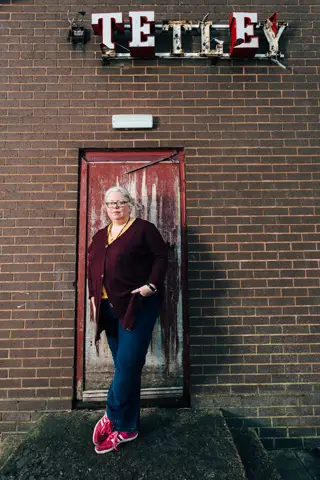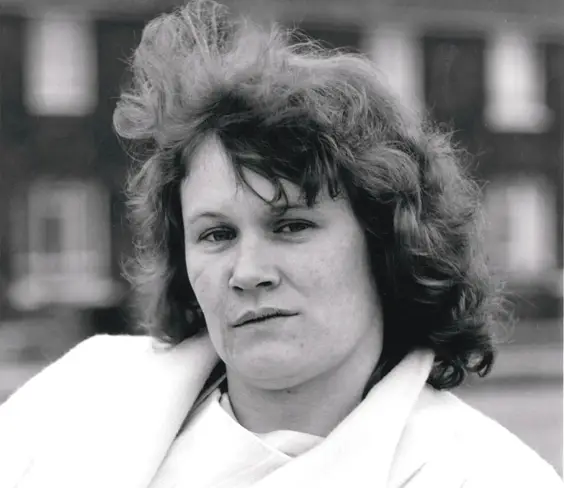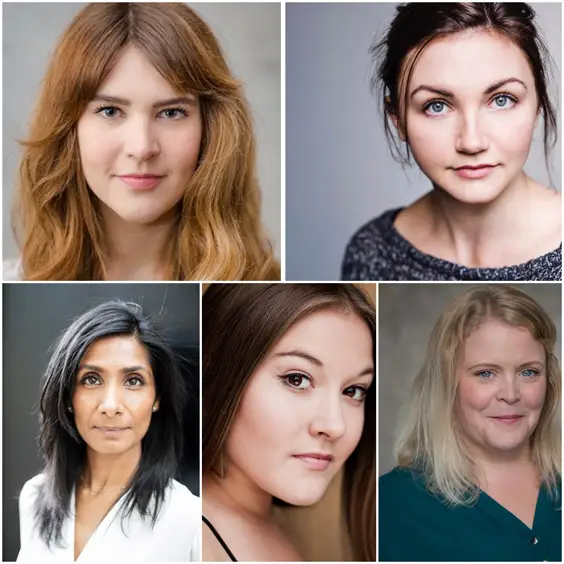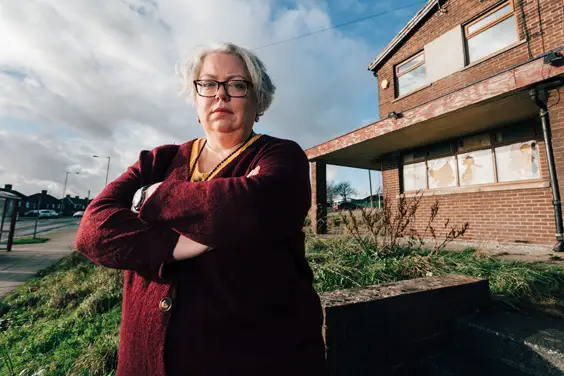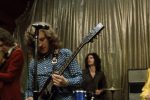An Interview with Lisa Holdsworth, TV & Theatre Writer
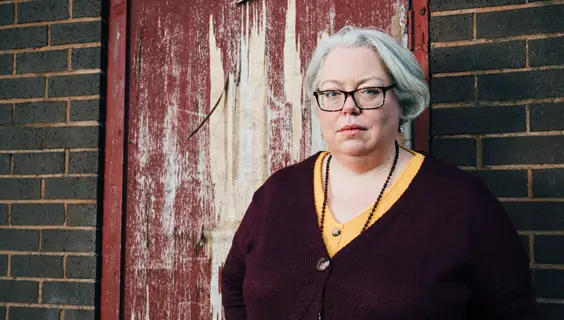
Leeds-born TV and theatre writer Lisa Holdsworth (Ackley Bridge, Waterloo Road, Call the Midwife) has adapted for stage Adelle Stripe’s novel about the defiant life of celebrated Bradford playwright Andrea Dunbar.
Dunbar wrote three iconic plays, The Arbor (in 1977 at the age of 15), Rita, Sue & Bob Too (1982) and Shirley (1986) before dying of a brain haemorrhage at just 29. The play, Black Teeth and a Brilliant Smile, tells Andrea’s story as the acclaimed writer struggles with her latest work, her aching head full of voices and stories from her past which have to be heard.
Lisa speaks to Richard Mansfield about the play, the life of Andrea Dunbar and ensuring her voice is never forgotten…
As it appears we can claim you as a local writer, which Yorkshire authors or playwrights have you most admired and why?
I think Alan Bennett is the daddy of them all and the fact that he writes stuff that feels very relatable. But my absolute heroes are local TV writers: there’s Sally Wainwright who I just think, even on her worst days, is writing some of the best drama you will see on television, Kay Mellor obviously, Alice Nutter I’m a big fan of. She used to sing with Chumbawamba and is now a writer for television and theatre. So we are very lucky in this region. Novelists as well, even down to James Herriot, one of the best selling authors of all time; those books are still incredibly readable. There is a rich literary history in this region, so I feel like I’m lucky to be even a tiny part of it.
“It was an absolutely authentic working class voice”
Given what is sometimes thought of as the north-south divide, do you think provincial or regional authors are at an advantage or disadvantage when having work recognised and published these days?
I think a reality for anybody who is outside what is considered the ‘North’, and that goes for if you are a black or Asian writer, often a female writer or a gay writer, is that you are seen as niche, that your characteristics are seen as a genre and that is simply just not the case. There is room for many, many northern plays, novels, TV shows. Just because someone’s written about the north one week doesn’t mean it knocks out something that will be written about the north next week. I do think the southern half of the country do see us as a bit of an amorphous mass and couldn’t tell the difference between Redcar, Hull, Salford or wherever. They think it is all the same, whereas I think there are very distinct characteristics from West Yorkshire, to South Yorkshire, to the North East. So it is a lack of understanding and a desire to lump us altogether that I think is the problem.
Why do you think it is important for Andrea Dunbar’s story to be told?
I think because she wrote three brilliantly important plays for the canon. Because it was an absolutely authentic working class voice that you don’t get very often. So it would be a genuine loss to theatre, to literature if she was to disappear. Her story, because it was reflected so much in her work, is important, the fact that she was an outlier from most working class people with that kind of ambition. The reality of the economic barriers and the social barriers of getting into the industry are insurmountable. It’s no better now than it was thirty years ago. And so the way she beats a path to people, the way she tells that there is another Andrea Dunbar, sitting in a school in Bradford now, your voice is just as important as anybody else’s; it’s such an important message to put over and I am not sure that is breaking through at the moment. Don’t get me wrong, I love my Benedict Cumberbatches and all that kind of thing but I’d like to see some more real voices on TV and on the stage.
“Theatres can be enormously intimidating”
Her life story evokes a lot of ambivalent and polarised feelings among people I have spoken to. What feelings does she engender in yourself?
Admiration, because she had enormous barriers in her life to overcome. I don’t think that can be pushed aside, but also a certain amount of frustration with her, that there were times when she should have stood up for herself, pushed through. But that’s easy for me to say; I had an enormously supportive family, much more privileged than Andrea ever did. And then it breaks my heart that she’s not still around, that she wasn’t looked after. I think that she was let down by lots of people, not just in her family, the men that she knew, but also the people in our industry didn’t know how to look after her. And I don’t think that has got any better. That breaks my heart because she should have a BBC1 9 o’clock series starting on Sunday, banging on Sally Wainwright’s doors. She should definitely still be an important voice and she’s not, we’ve lost her.
The play is to be performed in a Bradford pub by Freedom Studios, with experienced actors. What element of that ‘extra something’ or ‘difference’ do you think will be brought to the audience experience in this setting?
I hope it makes it more accessible and relaxing for people to go and see because it is a tough story, but we can’t shy away from that; there are things in it that people will find uncomfortable but I want to present it in a space where people feel a bit of ownership, will feel that it is their space. Theatres can be enormously intimidating for people and I think they are set up to be; you know ushers, why is it called the box office, not just the ticket desk? All that kind of thing. So doing it in a pub, letting people relax means that they can watch something that is challenging, that is sometimes uncomfortable but still be safe and welcoming. I think a lot of places are unwelcoming. I think we are lucky in this region; theatres do good outreach work, but some of those theatres, if you go to London are just unpleasant, not a nice space and they exclude people. I think they are set up like that, so why not do it in a pub, relax and have a drink?
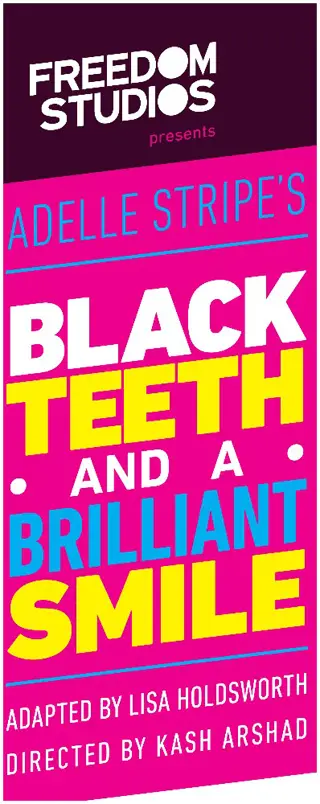 “There are two versions of Andrea”
“There are two versions of Andrea”
The cast will be all female, in a way perhaps reflecting or emphasising that among the people that really counted and mattered, there were few positive male role models in Andrea’s life. Is it perhaps a touch ironic that the two teachers who seem to have made a difference, and who Adelle Stripe mentions in her novel, are both male – the art teacher and the drama teacher?
The men in her life are not excluded from the stage, they are still there, they are still part of the story; it just happens to be a story that we’ve decided to tell with women. So, there are plenty of stories that are told exclusively by men. That is usually not highlighted. It just happens that in this story they’re the vast majority of people we are interested in; there are two versions of Andrea for a start and Andrea’s best friend is a composite character, also her mother; those people felt like good stronger voices. The artists (teachers?) were important, but a blip in Andrea’s life, an important moment, but actually the really important people in her life were the women, the women who were with her constantly, and the reality is that in her life some of the men, not all of the men, in her life were not good influences on her and did not treat her right. I didn’t want to put them on stage.
Would you agree that in some respects Alma, Andrea’s mother, is the person who emerges as most deserving of respect?
She was I think a force to be reckoned with, she was in an enormously difficult situation herself – a large family, an alcoholic husband, abusive husband as well – although it was unclear whether he was ever abusive to Alma, but he certainly was to the children. Despite her circumstances, she fought for her kids and she is a big part of why Andrea ever did what she did. If Andrea had been sent away to the school for unmarried mothers, I think the shame of that, the exclusion of that might have meant Andrea never put pen to paper, never felt included, never felt in a world she could write about. I don’t think anything would have sorted Andrea out but it might have been another barrier, would have been another step too far for Andrea to get to where she needed to be.
“What we are seeing now is the last roar of the dinosaur”
Andrea I think refers to ‘useless’ men and that certainly seems a fair comment given the male characters in her life. Do you think men are making any progress?
Ha! Ha! That’s a really good question. Yes, in my experience, they are. I think what we are seeing now is the last roar of the dinosaur. It’s interesting to see what is going on in America at the moment. I do think it’s the last attempt to control women. So I think in twenty years time we will look back at some of the behaviour of people towards people, irrespective of their gender, and be horrified by it in the same way we are horrified by racism now. Every now and then it raises its head. It’s like a monster in a movie. Never quite dead and we have to make sure. And we’ve slept on it. That’s why sexism and racism has raised its head now but hopefully now we are strong enough to slap it back down.
Andrea’s bleak estate always seemed to draw her back and she is clearly unsettled when away from it. At one point she walks a good number of unpleasant and uncomfortable miles with a child in a pushchair to reach Buttershaw. The London scene did not lure her. Do you think this underlined a sense of dependency she had that was ultimately and tragically misplaced perhaps in alcohol use?
I think the premise of the question, the idea of it being bleak, yes. Brafferton Arbor is not the prettiest place in the world. Its name does not reflect what it’s like. However the sense of community, sense of belonging, sense of family that she required and possessed was there, which is why she was unhappy, why she’s unhappy in Keighley, why she’s unhappy in London. She didn’t feel comfortable; the people she knew and understood and wrote about brilliantly were just not there and it’s interesting that she never felt the need, after her London experiences, to write a play set in London. She wanted to write about things she knows, so I don’t think it was a dependency, it was a place where she could be herself.
Given Andrea’s work and the splendid films made by Clio Barnard (The Arbor, The Selfish Giant), other notable films from the past that have used Bradford as its backdrop, also some of Don McCullin’s telling photography, do you consider that Bradford is a city that continues to have to live down its reputation for dark skies and riots.
I think Bradford is one of the most misunderstood cities in the country. The BBC did that ‘We are Bradford’ recently. It was joyous and it was a truer reflection of Bradford that had been on screen for a very long time. My experience of Bradford is, yes, there is poverty but there is also an enormous diverse community, there’s people doing stuff for the joy of it in terms of art, theatre, music. Whereas, and I’m a Leeds girl born and bred, Leeds can be a bit fur coat and no knickers, it’s all front, whereas Bradford I find incredibly authentic, really honest, really inclusive and it doesn’t need to show itself off to the world. So I think that’s why it’s misunderstood. Its got bad PR, but then I think it’s not interested in PR anyway.
“She was uncomfortable in London”
In Adelle Stripe’s book, Andrea comments at one point, “Either I write or go back to the mill. There’s no other way out”. Yet, there is the underlying rhythm that she is out of her depth elsewhere and is always out of her depth away from Buttershaw. Do you think her talent could have been better nurtured or was she always going to be a kind of victim to her circumstances and out of her depth?
I actually think other people were out of their depth with her, that they didn’t know how to deal with her, how to look after her. They found her voice enormously confronting. People struggle with that. It is so much easier if you are living in Islington or wherever, and that’s a stereotype in itself, and I think there’s the ‘deserving poor’ and the ‘undeserving poor’ and all of that. And I think it’s that they had something so powerful in their hands with Andrea and they just didn’t know how to nurture it and to bring it on and she was uncomfortable in London. But then, if she’d immediately slotted into the London theatre scene and been the belle of the ball, her writing would have suffered and that would have been a shame. It’s that enormous balancing act. I see it with other writers now, authenticity can be lost, can disappear and everything can become very twee and contrived if you are not careful. And maybe that’s a position that could be laid at me, I don’t know.
For all her faults, Andrea’s talents for listening and relaying the reality of things are notable. Yet there is an underlying feeling that she was exploited by those far more advantaged and alien to her own background. In hindsight, might the support worker, who saw the quality in Andrea’s writing, have unwittingly made a mistake in despatching her work to London’s theatrical world, an element of which sought not only the realism in her work but also possibly its potential sensationalism? Would there have been other options at the time do you think?
She could have put it on locally I suppose, but one of the things about art is that there’s no point talking to an audience who already know what you are telling them, so I don’t think it ended fantastically for Andrea. I think speaking to that audience, giving them a flash of what made them squirm in their seats, even though they laughed in the wrong places, is the real function of art, to lift the curtain, pull it back and go, “You are going to struggle with this, but you need to hear it”. That’s the reason why Rita Sue and Bob, Too is still touring, is still relevant. There’s not a beat of that story where you know the backstory is still not true of young girls today. Irrespective of what race they are, they are still vulnerable and easily exploitable. But such an important play. And yes, maybe it set her on a path that had an inevitably bad ending but the legacy is still important and it would be a shame not to get that.
Lisa Holdsworth images: Tom Woollard
